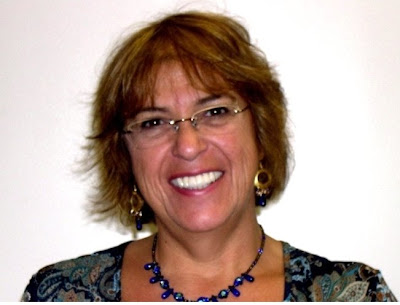 Barbra Nightingale
Barbra Nightingale writes real fantasy and last week Wednesday at Broward Community College, South Campus, she demonstrated this talent when she read from her prize winning collection,
Singing in the Key of L and her manuscript, "The Ex-Husband Files."
Many of the poems in the manuscript display an almost macabre sense of humor because they describe the traumatic events of the poet's life that resulted from her ex-husband's suicide and her discovery of his body nine days later. The poems, eighteen sonnets of rage, despair, loneliness and humor with rich imagery of the body as a landscape of passion and betrayal, are a tour-de-force. In every poem, Barbra shifts the perspective on everyday objects that surround our lives, cats, books, can openers, and hammers, and transforms them into metaphors of our deepest despair or hopes.
And there is always her playful humor. For even when she's vamping on the D(ead) W(hite) M(en) of the canon, "A thing of beauty is a boy forever," her sense of the fantastic hovers over every line so that the real becomes woven into dream, into fairy tale, myth, and re-enters the body as poetry that is grounded in the body, "an ear lobe, toe, small tender ankle" ("Making Love to a Cannibal").
During the reading, which she described as "cathartic," Barbra read one of her best known and favorite poems of the audience:
The Cape Was Never White
Little Red Riding Hood
First of all, I was not skipping.
I never skip, but yes, I was eating
strawberries: red, ripe, delicious.
I had heard rumors
that girls who ate them
would never want for men.
I was after the woodcutter
not the wolf, but the wolf
was quicker, sly, and intense.
I hadn't meant to enjoy it--
but being swallowed whole
was a definite kick
no man could ever give.
For more photos of the reading, click here: Barbra Nightingale @ BCC, April 4, 2007.
Barbra Nightingale has had over 200 poems published in various national and online journals such as Tigertail, The Best of Tigertail, MiPo, Ocho, The Appalachee Review, Kansas Quarterly, Barrow Street, The Chatahoochee Review, Mississippi Review, MacGuffin, Many Mountains Moving, Kalliope, Calyx, and others. She has five published books, including the Prize-winning Singing in the Key of L.
***
On Thursday, April 12, 2007, "In My Own Words: Frances Anne-Solomon."
Frances-Anne Solomon is an award-winning filmmaker, writer and producer whose credits include
Lord Have Mercy!, Peggy Su!, What My Mother Told Me and Bideshi. She is the president and artistic director of the two companies she founded,
Leda Serene Films and
CaribbeanTales, and has also worked as a radio film and television drama producer for the BBC. Her new film,
A Winter Tale, will open the Reel World Film Festival in Toronto on April 11th.
***



